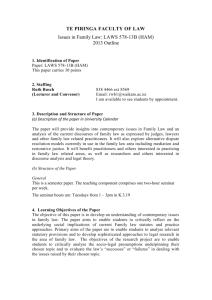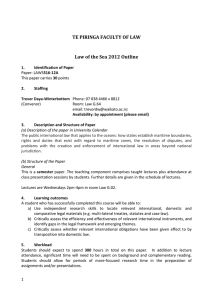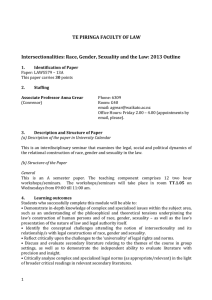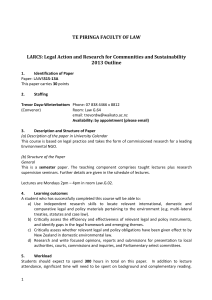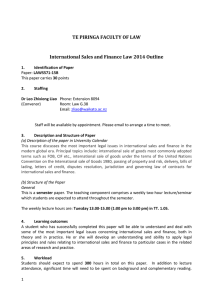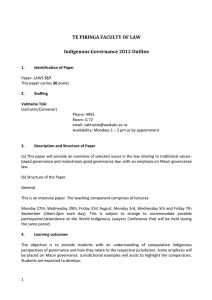LAWS577-13A National and International Protection of Human Rights
advertisement
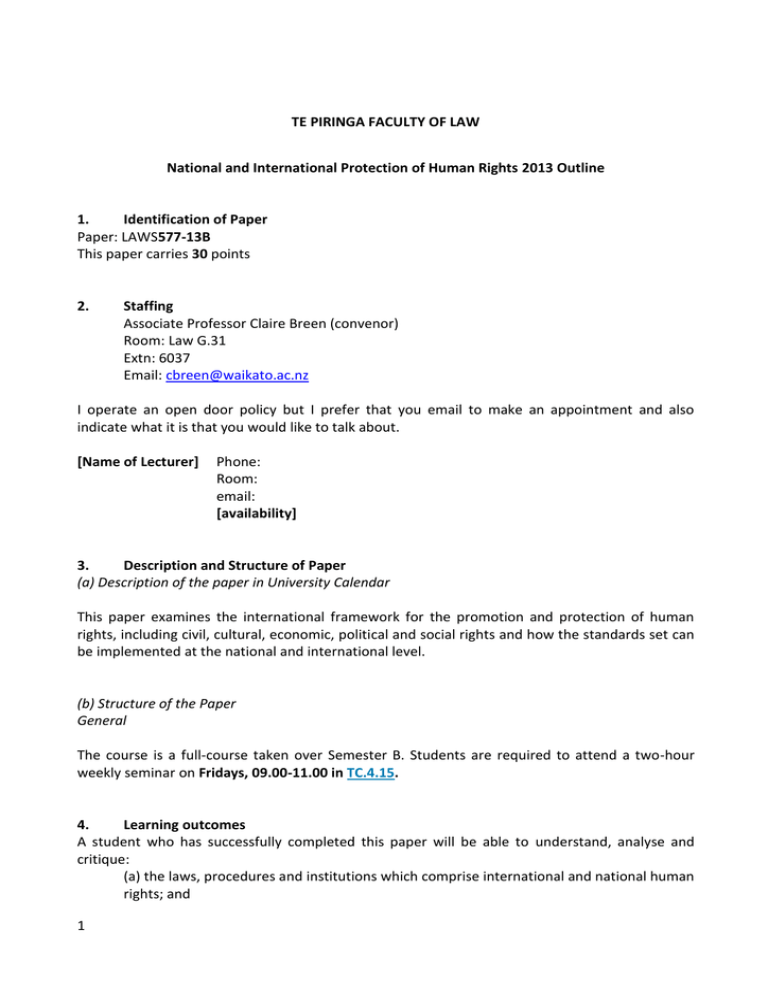
TE PIRINGA FACULTY OF LAW National and International Protection of Human Rights 2013 Outline 1. Identification of Paper Paper: LAWS577-13B This paper carries 30 points 2. Staffing Associate Professor Claire Breen (convenor) Room: Law G.31 Extn: 6037 Email: cbreen@waikato.ac.nz I operate an open door policy but I prefer that you email to make an appointment and also indicate what it is that you would like to talk about. [Name of Lecturer] Phone: Room: email: [availability] 3. Description and Structure of Paper (a) Description of the paper in University Calendar This paper examines the international framework for the promotion and protection of human rights, including civil, cultural, economic, political and social rights and how the standards set can be implemented at the national and international level. (b) Structure of the Paper General The course is a full-course taken over Semester B. Students are required to attend a two-hour weekly seminar on Fridays, 09.00-11.00 in TC.4.15. 4. Learning outcomes A student who has successfully completed this paper will be able to understand, analyse and critique: (a) the laws, procedures and institutions which comprise international and national human rights; and 1 (b) contemporary international and national human rights law and practice. 5. Workload Students should expect to spend 300 hours in total on this paper. In addition to lecture attendance, significant time will need to be spent on background and complementary reading. Students should allow for periods of more-focused research time in the preparation of assignments and/or presentations. 6. Required and Recommended Reading All law students are required to purchase, for use in all law papers, a copy of McLay, Murray & Orpin, New Zealand Law Style Guide, Thomson Reuters (2009). This is available from Bennetts, at an approximate price of $18.90. There is no set text or Course Materials. Students will be provided with a reading list. Students may find the following text to be useful Steiner and Alston (eds) International Human Rights in Context: Law, Politics, Morals (3rd ed 2007). General introductory chapters to international human rights law can be found in Textbooks such as: Brownlie, Principles of Public International Law Shaw, International Law Harris, Cases and Materials on International Law Evans, International Law Abass, International Law: Text, Cases and Materials. In addition, the above texts have introductory chapters on international law and the international legal system more generally. Students who have not taken Public International Law at the undergraduate level should read these chapters. The following journals may also constitute useful starting points: Human Rights Quarterly, Human Rights Law Review, International Journal of Human Rights, and the International Commission of Jurists’ Review. Students should also become familiar with the webpage of the Office of the High Commissioner for Human Rights, Amnesty International, Human Rights Watch, ESCR-Net, NZ Human Rights Commission ... Further material may be provided on the paper site on Moodle (http://elearn.waikato.ac.nz), the University of Waikato’s online learning system. Any such material is provided on the following terms: University of Waikato owns the intellectual property rights, including copyright, in and to this site, or has acquired the necessary licenses to display the material on the site. As a student of the Te Piringa Faculty of Law, you are granted a limited license to use (access, display or print a single copy) the material from the papers in which you are enrolled for the purposes of participating in 2 the paper only, provided the information is not modified. Materials may not under any circumstances be copied, stored, distributed or provided in any form or method whatsoever to any third party. Any other use of the material is prohibited. None of the material may be otherwise reproduced, reformatted, republished or re-disseminated in any manner or form without the prior written consent of University of Waikato. To obtain such consent, please contact the Te Piringa Faculty of Law. 7. Online support Online support for this paper is provided via Moodle. 8. Assessment a) Requirements for assessed work School procedures for the presentation of course work are set out in the Te Piringa Faculty of Law Graduate and Postgraduate Handbook which is available from: http://www.waikato.ac.nz/law/graduate. See also paragraph 12 below on referencing guidelines and plagiarism. Assignment resources are available online at http://www.waikato.ac.nz/law/student/ b) Coursework: Final Examination Ratio: 100/0 This paper is 100% internally assessed. c) Assessment Components Component Percentage of overall mark Due date Component Percentage of overall mark Due date Research Proposal Research Project (9,000 words) Research Seminar Presentation 20% 70% 10% Monday, 8 August (4.00pm) Tuesday, 29 October (4.00pm) to be arranged Research Proposal (20%) The research proposal should be 2,000 words in length and comprise: 1. A Topic and Thesis Statement. This sets out in one or two paragraphs the topic you intend to research. The statement should open with the questions and issues which have stimulated your interest in the topic followed by an explanation of why these questions merit the research in the way you propose. The statement should include a tentative thesis statement in which you articulate the propositions upon which your research paper is focused and any conclusions which you anticipate may emerge from your research. 2. An Annotated Structural Outline: this comprises an annotated outline of the structure of the proposed paper broken down into section headings. Under each heading you should provide a short explanation of how this section of the paper relates to the purpose of your research and your argument. Bear in mind the logic of the argument you want to make in support of the conclusion you aim to draw in answering your research questions. 3 3. An Annotated Bibliography: this comprises an interim bibliography annotating the items of core literature that appear to be relevant to your topic. 4. In some circumstances, additional material will be required, e.g., a timetable for the attainment of different objectives, a section on methodology, or an outline of ethical issues. The research proposal is not binding. Research work inevitably keeps changing, right up to its completion. The process of putting a proposal together verifies that you have found at least one piece of work that appears to be viable, and have begun to think systematically about the issues it raises. You may be required to amend your research proposal to ensure that you are adequately prepared to begin writing your research paper. The criteria involved in marking the proposal include: Clarity of definition of the topic; Logic, clarity and organisational structure of the outline; Relevance of the annotated bibliography and quality of the annotations; Proper use of the New Zealand Law Style Guide. Research Paper (70%) The research paper must be not shorter than 8,500 words and not longer than 9,500 words (including footnotes). In this paper the student must demonstrate the ability to: Engage in a detailed and critical analysis of the law relevant to the topic; Locate the topic in the relevant context(s); Make appropriate comparisons, if relevant; and Identify, discuss and analyse relevant core legal concepts. Research Presentation (10%) Students will be required to make a 15-20 minute presentation (20 minute limit strictly adhered to) on their draft research paper in class and to answer any questions about it (total time for each student presentation is 30 minutes). The presentation should demonstrate that you have responded to comments on your proposal. It should include an outline of the topic, its core questions, your research findings to date, and your argument. d) Handing in, marking time and collection All assignments must be submitted electronically through Moodle (http://elearn.waikato.ac.nz). See Te Piringa Faculty of Law Graduate and Postgraduate Handbook, available at http://www.waikato.ac.nz/law/graduate. Where practical, it is the policy of Te Piringa Faculty of Law to return marked work to students within five weeks of submission. If you require assistance with Moodle, or encounter any problems, please contact the Help Desk. You can send a message to Help Desk by using the instant message service in your paper’s Moodle site (from the participants list within the People block). Alternatively, you can email them directly at help@waikato.ac.nz or call 838 4008. e) 4 Measurement of Achievement Achievement in assignments and presentations will be measured in terms of levels of understanding and knowledge gained, in terms of the originality and the sophistication of analysis provided, in terms of coherent and logical structure, and in terms of the fluency and accuracy of expression and referencing. f) Management of assessment deadlines, process for requesting extensions and special consideration, and for appeals i) Extensions Students are required to complete and submit all internal assessment by specified dates. The meeting of deadlines is a mark of professionalism and its enforcement is essential for fairness to all students taking the paper. Handing in course work on or before the due in date also facilitates the timely return of marked work by academic staff. Students should meet requirements as to time deadlines for course work, or make a request for an extension or special consideration in appropriate circumstances (see Graduate Programmes Manual available from the School of Law Graduate website http://www.waikato.ac.nz/law/graduate/.) Failure to comply with requirements as to the time deadlines for internal assessment without having successfully applied either for an extension or special consideration with supporting evidence before the due date will result in deduction of 2.5 marks for each day the work is late. Lateness of more than a week may result in the work not being marked. No deadlines may be extended beyond two weeks after the last teaching day of the semester(s) in which the paper is taught as final grades must go to the Board of Examiners at this time. Unless an extension in writing has been granted, a lecturer may refuse to accept a piece of work which is submitted after the specified date, and automatically award it no mark, or may lower the mark as a penalty for lateness. Applications for extension, on the form obtainable from the Resource Room, must be submitted to the Convenor of the course. Extensions will be granted only on evidence of illness, family bereavement, or serious personal accidents or circumstances. Please note that too many assignments due at the same time is NOT an acceptable reason, neither are claims that computers and/or printers have crashed). Account will be taken of the time in which the student has had to complete the assessment before the supervening event occurred. It will be important to consider if the grant of the extension will give the student in question an unfair advantage over other students. A maximum period of 14 days will be given as an extension unless there are exceptional circumstances. In determining applications the Convenor or lecturer of the relevant paper may consult with the Chief Examiner or nominee. ii) Special Consideration The Assessment Regulations 2005 as set out in the University Calendar 2013 list in detail the university-wide policies and procedures, which apply concerning missed examinations, impaired performance or impaired preparation time for an examination, and missed or impaired course work. Students are responsible for ensuring that they comply with these regulations. Application forms for special consideration for internal assessment are available from the Resource Room. iii) Appeals (University Calendar 2013, Assessment Regulations 2005, Reg. 24) A student may appeal against any decision taken under these regulations. An appeal, comprising a written statement of the circumstances of the appeal, together with supporting evidence if available, must be submitted by the student in writing to the Director of 5 Student & Academic Services not more than seven days after the date on which notification of the relevant decision is received. Appeals under this section are considered and decided by the Deputy Vice-Chancellor by delegated authority of the Academic Programmes Committee. A decision by the Deputy Vice-Chancellor is notified in writing, and is final. 9. University Calendar Regulations and Policies Your attention is drawn to the following regulations and policies, which are published in the University Calendar 2013. Assessment Regulations 2005 Student Discipline Regulations 2008 Computer Systems Regulations 2005 Policy on the Use of Māori for Assessment Student Research Regulations 2008 Ethical Conduct in Human Research and Related Activities Regulations 2008. 10. Links to other papers There are clear linkages between this paper and all other papers with a focus on Human Rights, Indigenous Peoples, International Law and Public International Law. 11. Fees Refer to http://calendar.waikato.ac.nz/admission/tableoffeesandcharges.html. 12. (a) (b) Referencing guidelines and caution against plagiarism Referencing must be in accordance with the New Zealand Law Style Guide. All written work submitted for the purposes of assessment must be your own work. Copying or paraphrasing all or part of another person’s work, be it published or unpublished, without clear attribution, is plagiarism. Plagiarism is misconduct and is dealt with under the disciplinary procedures of the University as outlined in the Student Discipline Regulations 2008 in the University Calendar. “Plagiarism means presenting as one’s own work the work of another, and includes the copying or paraphrasing of another person’s work in an assessment item without acknowledging it as the other person’s work through full and accurate referencing; it applies to assessment presented through a written, spoken, electronic, broadcasting, visual, performance or other medium.” See section 3, Assessment Regulations (2013 Calendar) Unless approved otherwise by the examiners of the papers concerned, a student must not submit as assessment material that is substantially the same as material submitted as assessment for a different paper. (c) 6 The Te Piringa Faculty of Law’s policy regarding plagiarism is contained in the Te Piringa Faculty of Law Graduate and Post-Graduate Handbook and the Te Piringa Faculty of Law Graduate Programmes Manual, available from http://www.waikato.ac.nz/law/graduate/. 13. Health and safety The Law School’s Health and Safety representative is Ms Alison Saunders who is in Room Law G44 at ext 4167. 14. Class representation At the commencement of the semester a class representative will be elected by the students in National and International Protection of Human Rights. This representative is encouraged to communicate regularly with the Convenor. Students in this paper are encouraged to liaise with their representative to discuss issues of concern. Contact details for the Student Representation Coordinator, Academic Services Division, are as follows: Samantha Whittle, Student Services, ext. 6264, CHSSG.25 email: student.reps@waikato.ac.nz 15. Complaints procedures The brochure Student Concerns and Complaints Policy provides details of the University’s process for handling concerns and complaints and is available from Faculty and School Offices, The Gateway and Student Services Division and is contained in the Calendar 2013. See also the document Student Support Structure at Te Piringa Faculty of Law, available from the Resource Room. 7 Lecture Schedule B semester Week Commencing Programme of lecture topics 8 July (B Semester begins) AE 15 July AE 22 July AE 29 July Torture 5 August Right to Life 12 August Human Rights and Armed Conflict 19 August Teaching Recess 26 August Teaching Recess 2 September Right to an Adequate Standard of Living 9 September (12 Sept Kingitanga Day) Human Rights and the Environment 16 September Children’s Rights 23 September Poverty and Human Rights 30 September Student Research Seminars 7 October Student Research Seminars 14 October Study Week 21 October Examinations 28 October Labour Day Examinations 8
